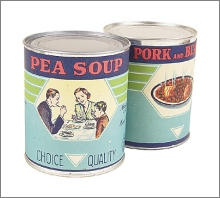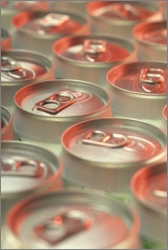Are Canned Foods Safe? What are Their Potential Risks and Healthier Options Instead?
by www.SixWise.com
Ever since 1812, when the first canning facility opened in the United States and began canning everything from oysters to meats to fruits and vegetables, canned foods have become a mainstay of American life.
|

Canned goods have been treasured for their convenience and shelf life for nearly two centuries!
|
No one can deny that they're convenient, economical and handy to have on hand for a last-minute dinner, but are canned foods really safe, or ideal?
Well, many health advocates say that fresh foods are best, followed by frozen and bringing up the rear are canned goods. Why? Largely because of the heat involved in the processing, and the potential toxins in the cans themselves.
What Does High Heat do to Canned Foods?
When a food is packed into a can, it is then heated to an extreme temperature to kill all known microorganisms. There is some debate as to what extent this form of pasteurization degrades nutrients and destroys enzymes in the food, but it is known to destroy at least some.
According to the U.S. Food and Drug Administration (FDA), "The heating process during canning destroys from one-third to one-half of vitamins A and C, riboflavin, and thiamin. For every year the food is stored, canned food loses an additional 5 to 20% of these vitamins. However, the amounts of other vitamins are only slightly lower in canned food than in fresh food."
The argument for canned food proponents is that canned facilities are usually just a few miles from the point of harvest, meaning foods are canned quite quickly after being picked. Fresh foods, meanwhile, may lose nutrients as they sit in shipping warehouses and during transportation.
"Most produce will begin to lose some of its nutrients when harvested. When produce is handled properly and canned quickly after harvest, it can be more nutritious than fresh produce sold in stores," says the FDA. "When refrigerated, fresh produce will lose half or more of some of its vitamins within 1 to 2 weeks. If it's not kept chilled or preserved, nearly half of the vitamins may be lost within a few days of harvesting. For optimum nutrition, it is generally recommended that a person eat a variety of foods."
|

Like canned foods, soda cans also typically contain BPA in their lining.
|
The Known Downside to Canned Foods
Assuming that many nutrient levels in canned foods are similar to fresh ones, why might you STILL want to opt for fresh or frozen over canned? Because of Bisphenol A (BPA).
BPA is a chemical used in countless plastic food and beverage containers, including plastic bottles and also the linings of most tin cans and soda cans. Not only has BPA been linked to fertility and reproductive problems and cancer, but recently it was also linked to an increased risk of heart disease, diabetes and liver disease.
Companies began using BPA in metal can linings in the 1950s and 1960s, and now there is widespread concern that chronic exposure to low doses of the chemical is causing serious health problems.
The FDA estimates that 17 percent of the U.S. diet is composed of canned foods, yet there are currently no government safety standards limiting the amount of BPA in canned food. However, a study by the Environmental Working Group (EWG) found some concerning findings.
|
Keep Your Healthy Fruits and Veggies Fresh Longer!
Once you invest in fresh produce for the health of your family, protect your investment using the MiniMate Refrigerator Unit.
The MiniMate deodorizes (replacing baking soda boxes in the fridge) and kills potentially dangerous food-borne bacteria. This extends the freshness and life of many foods 3 to 4 times longer!
Plus, the MiniMate:
- Features an activated oxygen generator to eliminate odors, keep foods fresher longer and kill bacteria in your refrigerator
- Naturally kills odors without any cover-up scents or fragrance
- Reduces food spoilage and prevents cross-contamination of food odors
- Breaks down pesticides and herbicides on produce
|
The group contracted a national analytic laboratory to test 97 cans of food purchased at three major chain supermarkets in the United States. Thirty brands of food were tested, including varieties such as soda, canned tuna, peaches, pineapples, green beans, corn, infant formula and tomato and chicken noodle soups. What did they find?
-
One in 10 cans of food tested -- and one in three cans of infant formula -- contained enough BPA in a single serving to expose a woman or infant to BPA levels more than 200 times the government's traditional safe level of exposure for industrial chemicals.
-
Among the worst foods tested -- chicken soup, infant formula and ravioli -- just one to three servings of the food contained levels of BPA that caused serious adverse effects in animal tests.
-
The bulk of BPA exposure definitely comes from food," says Jovana Ruzicic, a spokesperson for the Environmental Working Group.
As an aside, many canned goods also contain additives such as MSG, artificial flavors, preservatives, salt and artificial colors.
What are Your Options for Truly Safe Food?
If you choose to limit canned foods in your diet either because of nutrient concerns or the potential of toxic BPA, there are many other options. The top tips include:
-
Choose fresh produce that's locally grown. This way the produce is just-picked and the nutrients are still at their peak. To keep your produce fresher, longer, simply put a MiniMate Refrigerator Unit in your fridge (it keeps food fresh for three to four times longer than normal!).
-
Choose glass instead of cans. Many popular canned foods, such as soup, beans, soda and more, are available in glass jars or bottles.
-
Choose frozen veggies instead of canned varieties. They're just as convenient, without the plastic tin-can linings.
-
If you do buy canned foods, try to buy organic varieties and always read labels. Watch out for excess amounts of salt, sugar, corn syrup or any artificial ingredients and preservatives.
Recommended Reading
Warning: Diabetes, Liver, and Heart Disease Linked to Everyday Plastics What's Your Exposure Level?!
12 Dangerous Food Additives: The Dirty Dozen Food Additives You Really Need to be Aware Of
Sources
Environmental Working Group March 5, 2007
FDA/CFSAN Food Safety A to Z Reference Guide
Mealtime.org